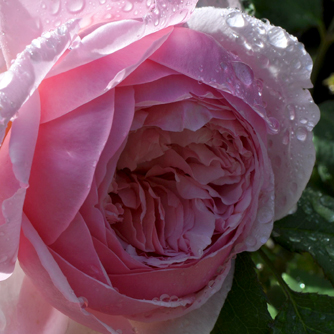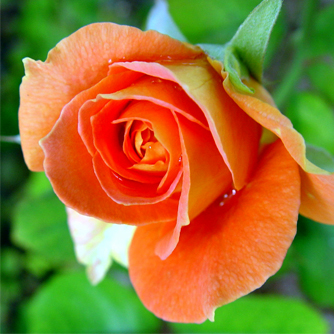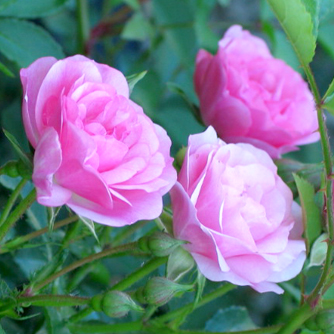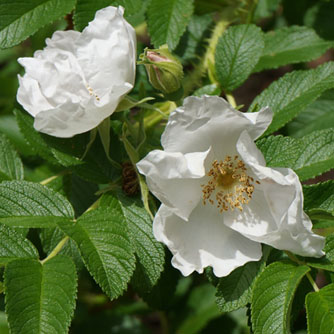Roses
BackRoses are the queen of flowers with their stunning blooms and, if you choose wisely, intoxicating perfume. Whilst some people imagine roses need a lot of care and chemicals the reality is you can grow beautiful organic roses very easily. Get the basics right and the flowers will just keep coming!
Don’t forget to download our Organic Rose Care Guide as well. It’s located to the right just above the first rose photo.
Plant selection
All roses look great on their label yet many are terrible performers needing constant care to survive. There are also roses which perform well in some climates but poorly in others so it’s important you choose strong vigorous varieties which suit your area.
Some modern breeders are focusing on plants which have better resistance to diseases but you could also consider heritage roses. Heritage, or old-fashioned, roses were bred many years ago, before the reliance on chemicals, and have stood the test of time. This them a good place to start when selecting plants. Rarely available in regular nurseries heritage roses can be ordered from specialist rose growers. Search online to find nurseries which stock them.
You can also ask these speciality rose nurseries which roses they recommend for your climate or approach the National Rose Society of Australia to find your closest branch and their local experts. Doing some research now will save you time and money in the future.

'Duchesse de Brabant' is a beautiful pink heritage rose
Location, Location, Location!
Roses need sun so plant them where they’ll get at least 6 hours of direct sunlight. Less sun means less flowers and more disease problems.
Roses will grow in a wide range of soils but do best in rich fertile soils that don’t get waterlogged. If your soil is a bit lacking then dig in plenty of manures and compost to beef it up. Apply gypsum to heavy soils to break up clay and improve the drainage before planting.
Fertilising Roses
Roses are hungry plants. Feed them every two months with manure, compost or a Certified Organic fertiliser like Rooster Booster. For really amazing flowers also use OCP eco-aminogro with OCP eco-seaweed every 2-4 weeks and apply either to the foliage or water into the soil. Don’t fertilise in winter when plants are dormant and are needing a rest period.

Opening orange rose bud
Pruning Roses
Winter Prune
Most roses are pruned hard in winter to stimulate new spring growth and more flowers. Whilst rose pruning might seem daunting it’s actually pretty straightforward.
• Used clean and sharp secateurs
• Cut out all dead and damaged wood
• Cut approximately 1cm above a bud on a 45 degree angle
• Cut vigorous bushes back by two thirds
• Cut less vigorous bushed back by only one third
• Spray pruned bushes with a mix of OCP eco-oil and OCP eco-fungicide to clean up any pests and diseases
Of course there are more things you can do but honestly the above steps are good enough 90% of the time.
If you’re growing heritage bush roses or David Austin’s these usually don’t require such a hard prune as they naturally develop into nicely shaped shrubs. Instead the winter prune involves only removing 10-20% of growth all over the plant. Then remove any dead or damaged wood and you’re done!
There are some roses which only flower once a year in spring, like banksia roses. These should not be pruned in winter but after flowering finishes in spring.
Post Bloom Prune
Cut back finished flower stems by 15-20cm to keep bushes tidy and to encourage another big flush 6-8 weeks later.

Floribunda rose with its cluster of blooms
Pest & Disease Control For Roses
If you’ve chosen the right roses for your climate, given them plenty of sun and nutrients then they will give you good healthy growth. Any problems should be only short term and can be dealt with organically using:
- OCP eco-oil for aphids and mites
- OCP eco-fungicide for powdery mildew and black spot
- OCP eco-neem for caterpillars
Note that scale is also common on roses and can be controlled with horticultural oil sprays. If rust appears on foliage then use an organic fungicide.
If you have a plant which is constantly sick and you’ve done all the right things then pull it out and choose a different type. Seriously!
Weeds around Roses
Roses are very sensitive to herbicides containing glyphosate (eg Roundup and Zero) and exposure to the chemical results in severely stunted/distorted growth. Exposure can come from drift when spraying or residue in the soil being taken up by the roots. Glyphosate based herbicides are also not organic.
Instead mulch around the plants to deter weeds and hand weed or spray with OCP Slasher Organic Weedkiller. Slasher is safe to use around roses (just don’t spray the actual bushes) and there’s no lasting soil residues.
For more advice on growing roses without chemicals check out All About Roses by Diana Sargeant.

White rugosa rose with distinctive crinkled foliage


